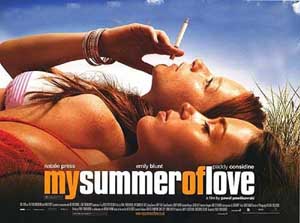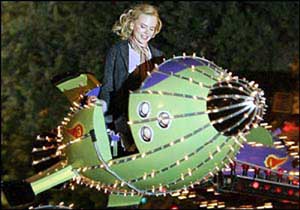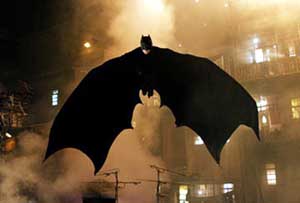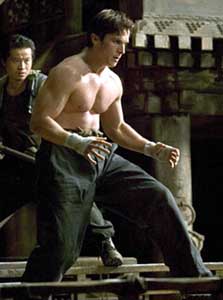-
- U.S. reaches disappointing milestone in AIDS epidemic
- Efforts intensify to end ban on openly gay soldiers
- Conservative Salt Lake City has surprisingly high gay population
- Mass. same-sex marriage initiative expected to change dynamics of debate
- Sex, lies and schools in ‘The Education of Shelby Knox’
- Iowa Supreme Court refuses to tamper with termination of civil ruling
- National News Briefs
- World News Briefs
Arts & Entertainment
Out at
the movies
Published Thursday, 23-Jun-2005 in issue 913
My Summer of Love
(R)
In 2000, there was a small French film, Come Undone, which made a brief appearance in the U.S. It was a coming-of-age, queer love story involving two perfectly cast male leads. The characters were unpredictable and the story was messy and convoluted. To put it simply, the story was a slice of life. For those of you familiar with cinema from outside the U.S., and in particular French films, the stories often end without clear resolution and without a positive spin (Amélie being an obvious exception). For most American filmgoers, this approach just doesn’t cut it. We love our stories to end happy and with a definitive end (I call it the “Disney effect”). Most American films tend to escape from reality instead of confront it.
Fast-forward to 2005: We have a small British film called My Summer of Love that is a coming-of-age, queer love story involving two perfectly cast female leads. The characters are unpredictable and the story is messy and convoluted. Sound familiar?
Set in rural England, tomboy Mona (played brilliantly by Nathalie Press) meets the aristocratic, attractive Tasmin (Emily Blunt) during summer break. Mona, stuck in her hometown with her older brother (Mona’s only remaining family), spends her days coasting down dirt roads on her motorless motorbike. Tasmin, stuck in her family’s summer mansion, stumbles upon Mona while horse riding. Immediately drawn to each other, Mona and Tasmin spend their summer together first as friends and ultimately as lovers. Together they find love, and in the process they come to a self-realization of who they really are.
The plot eerily follows the same story arc of Come Undone; however My Summer of Love is the superior film. Mona and Tasmin’s complicated relationship, which is never an issue about them being gay, is completely refreshing and original. The performances from Blunt and Press are real, honest portrayals of women on the verge of finding themselves.
Phil, played by Paddy Considine (catch the film In America to see him in a great performance), is Mona’s born-again, convict brother. Their side story is a little overdone, but the ultimate outcome of the story singles out their relationship.
Shot with French sensibilities, Love has a mood-enhancing soundtrack and remarkable cinematography. The English countryside has never looked so bright and relaxing on film (maybe too relaxing). The film runs slightly long for being only 86 minutes. Every so often it felt like the filmmakers were using gorgeous countryside shots a little too much. Regardless, My Summer of Love is an outstanding piece of “slice of life” cinema, something the French would be proud of.
Bewitched
(PG-13)
Gone are the days where a movie trailer excites people without giving away the entire movie. In particular, action and comedy have been the victims of the marketing machine. Action previews tend to give away all the amazing shots in a fast-clip montage set to exciting music. The comedy previews tend to give away all the best jokes, as well as lay out the story from beginning to end. The marketing people have successfully created excitement for their movie, but the end result is disappointment because once you see the movie, you realize all the good stuff was shown in the preview.
Seeing the preview for Bewitched pretty much tells you everything you need to know about the movie: mindless comedy, a few smart one-liners, good actors (stuck once again in a sub-par film) and a script that doesn’t make complete sense.
The premise for Bewitched (for you young’ens, Bewitched was a popular TV show in the 1960s) collapses under its own weight. Isabel (Nicole Kidman) is a witch on the run. She relocates to Los Angeles to start her life over, with the commitment to herself that she will never use magic again. She’s grown tired of getting her way all the time, and wants to find love. Her mischievous father (Michael Caine) has sworn off love, and warns his beloved Isabel that she shouldn’t fight who she is. The closeted gay overtones aren’t obvious in the film, but they’re there nonetheless.
Jack Wyatt (Will Ferrell) is a big-time movie star who is dealing with his career after he makes a huge box office flop. To counter his career’s downward spiral, he agrees to star in a new version of the television show “Bewitched.” The key difference is the new version will be about his character, Darren, instead of Samantha the witch. Anyone who has seen the original television show knows that this is a huge mistake, but to appease Jack, the producers agree. Jack insists on finding an unknown for Samantha, and once he stumbles across Isabel, he asks her to be his TV wife. From this point, the predictable and not completely enjoyable script takes over.
While the jokes are cute and funny, many of them were expected due to the onslaught of studio promotion, mainly on television. The concept of a television show as a movie about the making of the same television show seems like a solid concept with plenty of opportunity for humor and romance. Even the “witch who doesn’t want to be a witch playing a witch on TV” premise has ample room for humor. However, the script has to be intelligent to pull it off, which is where Bewitched ultimately fails. Writer/director Nora Ephron (Sleepless in Seattle, You’ve Got Mail) wastes a lot of good talent in the process.
Will Ferrell is again the highlight of an otherwise bland movie, making his scenes fun and bearable. Nicole Kidman, in perhaps the toughest role of the film, plays Isabel (Samantha) appropriately, all the way to the perfect nose wiggle. Michael Caine and Shirley MacLaine are both lost in story lines that were clearly edited down to almost cameo-level appearances (the studio or the test audiences could have had a hand in this). It’s a shame, because the actors make their scenes work even when the script wanders without a clear focus. With these kinds of actors, our expectations should be high.
With only 45 minutes worth of actual plot, Bewitched clocks in at 90 minutes (never a good sign for an already short film). While not as big a mess as Kidman’s The Stepford Wives, Bewitched never takes off (or flies, for that matter).
Batman Begins
(PG-13)
After 1997’s Batman and Robin, the prospect of another Batman movie seemed as likely as an R-rated film about Jesus Christ making the top-10 films of all time. Warner Brothers, which started the Batman franchise spectacularly with Tim Burton’s Batman and Batman Returns, ushered in its demise just as quickly when it hired Joel Schumacher for Batman Forever. Schumacher turned Burton’s gothic vision into campy trash, focusing all his energy on special effects and over-the-top villains. The final straw for the public was Batman and Robin, starring George Clooney as the Dark Knight and Arnold Schwarzenegger as Mr. Freeze. The highlight had to be Arnold’s line, “Tonight, hell freezes over!” The much publicized nippled Batsuit and bad acting were just icing on the cake.
Apparently, hell really did freeze over, because Mel Gibson managed to make the R-rated The Passion of the Christ and the caped crusader finally makes a triumphant return in Christopher Nolan’s Batman Begins.
Nolan, best known for writing and directing the indie favorite Memento, starts from the beginning and completely erases all the previous Batman films. It’s a smart move, as Nolan’s vision is about realism instead of fantasy. Gone is Tim Burton’s gothic architecture of Gotham City, gone is Schumacher’s campy colors and story-light scripts. Nolan sees Batman not as a superhero, but as real man with real problems who believes in justice in a Gotham City that is lost in injustice.
The film starts with Bruce Wayne (Christian Bale) stuck in a Chinese prison. Having run away from Gotham (we are told in flashbacks) to discover the mind of a criminal, Wayne is sprung from jail by the mysterious Henri Ducard (Liam Neeson). Intrigued, Wayne trains under Ducard to become a member of a secret ninja society called the League of Shadows. Upon his return to Gotham, Bruce begins to formulate the persona that will ultimately become Batman. Alfred (Michael Caine) along with Wayne Enterprises employee Lucius (Morgan Freeman) assist Bruce in his quest to create a legend that all criminals will fear.
Of course, what would Batman be without appropriate villains? The highlight has to be Scarecrow (Cillian Murphy, best known for 28 Days Later), who never leaves a victim sane. As Gothamites are going crazy, Batman must figure out who Scarecrow is, and more importantly, who he works for. Detective Jim Gordon (Gary Oldman), perhaps the last good cop in Gotham, befriends Batman as they both work to save Gotham from complete mayhem.
The cast in Batman is top notch. Christian Bale (American Psycho), the best Batman to date, does an outstanding job humanizing a character that has always seemed unreal and cold in past films. It seems obvious, but Batman can bleed, can be hurt, and is not superhuman. Michael Caine, often seen in supporting roles, brings a fatherly influence into Alfred that was missing before. And Gary Oldman as a good guy has to be the most inspired casting decision of the year. Morgan Freeman is the best supporting character, bringing his humor and intelligence to a character that could have easily been lost among the action and drama.
The realism of Nolan’s Batman seems like the only natural way to tell the story. Gritty but bright, fast but detailed, the plot moves along quickly with purpose. It is difficult to imagine another Gotham City or a different Batman after watching the film. Significant thought has gone into the development of the characters, which is a novel idea for a blockbuster. As blockbusters become special-effect events, character development often gets lost, if not completely left out. To actually feel anything for any of the characters is a tribute to the director and actors involved.
Katie Holmes plays the love interest Rachel Dawes, and the filmmakers wisely avoid anything serious. Considering other comic book films, specifically Spiderman, spend too much time on unconvincing love stories, it was refreshing to see this film avoid the clichés.
All is forgiven, but due to the heavy character development, Batman is perhaps 10 minutes too long. Regardless, Batman Begins soars, thanks to inspired performances from the actors involved, and to Nolan’s vision and tight, focused script.
|
|
Copyright © 2003-2025 Uptown Publications





